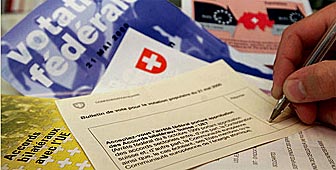Voting patterns: overwhelming support from French-speakers and urban areas

Traditional voting behaviour in Switzerland has repeated itself in the referendum on the bilateral agreements. French-speaking Switzerland has shown itself once again to be more pro-European than the German-speaking cantons.
French-speaking Switzerland has a tradition of being more pro-European. In the 1992 vote on membership of the European Economic Area, which was narrowly rejected, 30 per cent more francophones voted “yes” compared to their German-speaking compatriots.
This time around the francophones came out strongly in favour with the “yes” vote peaking at just over 80 per cent in canton Vaud and almost 79 per cent in Geneva and Neuchatel. But the divide between the two linguistic regions was not so wide as in previous votes.
In urban areas in both French- and German-speaking parts of the country, the “yes” vote has also been high. Both sides of the Röstigraben have embraced the bilaterals albeit for different reasons.
Some political scientists say the French-speakers agreed because they see the bilaterals as a step towards EU membership, whereas the German-speakers view it as a way of avoiding full membership.
The main split in voting patterns has been in accordance with the size of the canton’s population. The larger cantons and the cities of Zürich, Basel, Berne and Lucerne have given the bilateral agreements a resounding thumbs up, whereas the smaller cantons have been less overwhelming in their support.
The turnout in the referendum has followed the trend of recent votes. Only 48 per cent of those eligible to vote actually did so.
There are a number of reasons for the traditionally low turnout. These include voter fatigue, overly complex issues, simple voter disinterest and the assumption that the results would be a foregone conclusion and there was no point in casting a ballot.
As for the “no” votes, Ticino’s majority vote against the bilaterals is no big surprise. It reflects regional fears of an influx of cheap labour from the Lombardy region of Italy leading to a rise in unemployment and a drop in salaries. A fear the anti-European Lega dei Ticinesi was all too ready to emphasise in its campaign leading up the the referendum.
That kind of fear hasn’t presented itself in French- and German-speaking parts of Switzerland. The main border cities, Basel and Geneva, already have large numbers of foreign workers, and the thinking is that workers who will be attracted to those cities will be high-earning professionals.
Canton Schwyz’s narrow rejection of the bilaterals is also more of a protest vote than a show of anti-European feeling. Analysts put that down to fears of an increase in the numbers of heavy goods vehicles thundering along the canton’s motorways and a rebellious tradition of bucking the national trend.
by Jonathan Summerton

In compliance with the JTI standards
More: SWI swissinfo.ch certified by the Journalism Trust Initiative
You can find an overview of ongoing debates with our journalists here. Please join us!
If you want to start a conversation about a topic raised in this article or want to report factual errors, email us at english@swissinfo.ch.